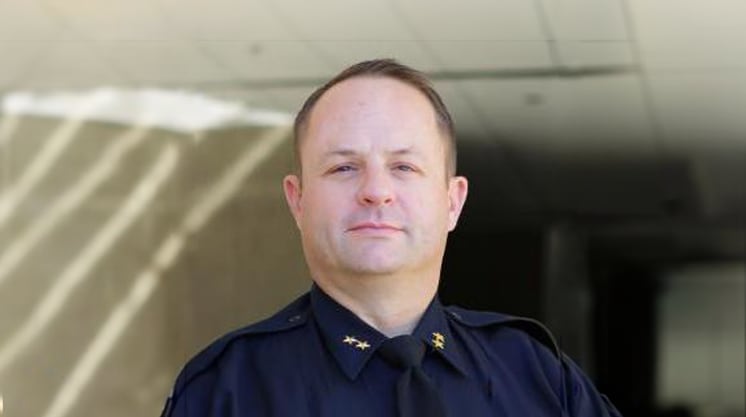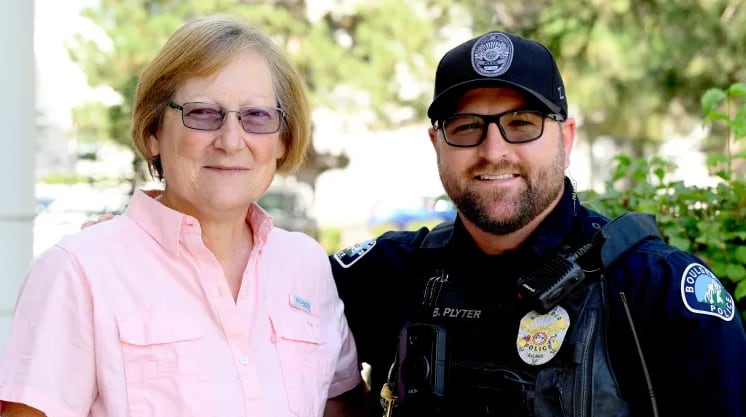Boulder Police Officers Pam Gignac was the first officer to arrive at the Table Mesa King Soopers on March 22, 2021. Nine people had just been fatally shot when she ran inside with Sergeant Bryan Capobianco and Officer Eric Talley. Moments after entering, Talley was shot and killed by Ahmad Alissa.
Officer Bryan Plyter was in the second wave of responders and ducked when Alissa began firing at them.
More than two years later, both Gignac and Plyter took the stand at Alissa’s trial and then lined the back of the courtroom with fellow officers as a judge read off guilty verdicts that would send Alissa to prison for the rest of his life..
“I expected that to be the verdict,” Plyter said. “I didn’t have any relief because I was fully expecting that was going to be the verdict. Kind of like when you drop your kid off at school and you expect them to go there. It would be like if the school called and said, ‘Hey, your kid showed up at school today.’ Well, I know, I dropped him off there. That’s supposed to happen.”
Gignac said during the verdict reading her focus was on the victim’s families who she had first met in the walkthrough of the store, three weeks after the shooting.
“I was worried for the families that if we didn’t get guilty verdicts it would have just devastated them,” Gignac said. “I was actually holding my breath at the beginning and then when she said the first guilty, I didn’t care about the rest of them. We just needed one. So, I was so happy for the families.”
‘I’m definitely not the same officer I was the day I responded to King Soopers’
Today, Gignac works in the marijuana licensing sector of the department after years of being on patrol. Following the shooting, she was given space and time off for mental health before returning to patrol.
“I was going stir crazy so after about a day and a half so I went back to patrol,” Gignac recalled. “The only way it changes you is that if another big call comes out you — because you’ve been there and gone through that — you can approach it in a much more calm and collected manner and be thinking about all the angles when you’re going to a call. What was ironic was the first call I got back on the street was a possible weapons, shots fired call. So I’m just going up there and I’m just laughing and thinking well isn’t this ironic.”
Gignac said she had to learn early in her 42 years on the force how to handle the trauma that she witnessed.
“I just love the career,” Gignac said. “I also know it can destroy you very quickly if you don’t learn early on in your career how to handle the stress and the bad stuff because we see the worst in people, we see the things that people should never have to see in their life. So you have to learn how to process that and try to turn it into a positive and still remember that you’re human and have your life to live. This is the path you chose. It’s no big thing I do, I just try to stay positive and not let the negative take you down.”
Plyter said the stress from the incident has changed how he polices.
During testimony, officers explained that they were under the belief that there were multiple shooters in the store when they entered and lacked cover at the entrance of the store where Talley was murdered.
When Plyter arrived at the Table Mesa King Soopers that day, he was the only person on scene with a shield. Police shields can differ in their ratings. On that day, Plyter only had a pistol rated shield, meaning it could stop bullets from a pistol but not those from a rifle or automatic weapon. A rifle rated shield is needed to stop assault rifle bullets. Without realizing the only shield they had would not protect against Alissa’s bullets, Plyter stood at the front of the group as they made their way into the store, all piling behind the shield. Shortly after, an co-responder noticed that Plyter had a pistol-grade shield — useless if Alissa fired at him with an assault rifle.
“One of the rifle rated shields is always in the back of my car,” Plyter said Tuesday. “They’re shields that anyone can check out, and not so much anymore but there was a joke there for a while that if I went out to my car and I didn’t have my rifle rated shield or there wasn’t one available I would be like, ‘Who took it? Who took the shield?’”
Plyter said people on his shift “just knew” and would hand over the shield if they had one. For Plyter, having accessible and available rifle-rated shields was a “very big sticking point” after the shooting. He said he worked with higher ups in the department to find funding to acquire three more shields. Plyter was active in reaching out to suppliers, testing the shields and picking out the ones the department would buy.
Plyter is also a member of the peer-support team at the department and instructs recruits on officer survival techniques.
“I’m definitely not the same officer I was the day I responded to King Soopers,” Plyter said. “I think my focus and my mission from that day forward has changed to really focus on the people within the (police department). Losing Talley may have played a role in really spending a lot of time and making sure I’m spending valuable time with the people I work with in this building because after losing Talley, I realized how much the people in this building mean to me.”
‘I’ll go the rest of my life with what I saw and did on this call’
Beyond the impact to his police work, Plyter has been forced to face the chances of mortality in his field and the impact it could have on his loved ones. During his testimony, Plyter recalled thinking about his son as he entered the building.
“I made a decision that I was probably going to lose my life going into this store. I thought about my child and how I may never see him again,” Plyter said on the stand.
On Tuesday, Plyter said, “Every time I say goodbye to him now … it’s definitely not the same as it used to be. I hold him a lot tighter than I did before. I always loved him but I think I just don’t take for granted the amount of time and quality time I get to spend with him.”
Following the shooting, Plyter and some other responding officers got the Talley’s radio number, 295, tattooed alongside the date of his death.
Even without a tattoo, Gignac said she’ll never forget that day.
“It does change you,” she said. “I’ll go the rest of my life with what I saw and did on this call. What I try to tell myself every day is that we did the best we could with the information we had.”
In years since, officers are now nominated for the Eric Talley Memorial Award, given to those who “frequently exceed expectations when helping others within the department both professionally and personally.”
“The thought process when I was talking with the people who were close with Talley about his award is that we wanted to do an award that represented not actions on that day, which while heroic and saved many lives, an ultimate sacrifice, right, we wanted a memorial award to tribute how he lived and not how he died,” said Plyter, who helped draft the award and has also been nominated for it. “He was a person who lived in service to others and that didn’t just include the community he worked in, it included the people he worked with, it included his family. The award is designed to go to people who embody those characteristics.”
Plyter recalled Talley’s daughter saying at sentencing that while Alissa took her dad from her, she wouldn’t let him control her happiness and her life anymore.
“My hope is that people no longer allow this individual to have the power to control their happiness anymore and they can find some peace after this and move on from it,” Plyter said.



